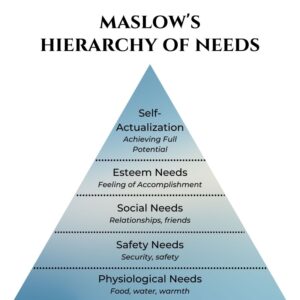As consumers, we all make purchasing decisions based on various factors. From price and quality to branding and advertising, the psychology of consumer behavior plays a significant role in our choices. By understanding the psychology of consumer behavior, businesses can tailor their marketing efforts better to meet the needs and desires of their target audience.
 Maslow’s Hierarchy of Needs
Maslow’s Hierarchy of Needs
One of the most well-known theories in the psychology of consumer behavior is Maslow’s Hierarchy of Needs. This theory suggests that humans have a hierarchy of needs that must be met in order for them to be motivated to make a purchase. At the base of the hierarchy are basic physiological needs like food and shelter, followed by safety, social, esteem, and self-actualization.
A great example of a company that effectively uses this theory to its advantage is Whole Foods Market. Whole Foods understands that its target audience values quality and health above all else, and it uses this understanding to appeal to its customers’ esteem and self-actualization needs. By promoting organic, sustainable, and locally sourced products, they tap into their customers’ desire to be healthy and responsible community members.
Social Proof
Another psychological factor that affects consumer behavior is the concept of social proof. Social proof refers to the idea that people are more likely to make a purchase if they see that others have made the same purchase before them. This is why online reviews and ratings are so important in today’s digital age. Companies like Amazon and Yelp use this to their advantage by prominently displaying customer ratings and reviews on their websites.
A great example of a company that effectively uses social proof in its marketing is Airbnb. By displaying customer ratings and reviews, potential guests can see that others have had positive experiences with the host and their property. This helps to build trust and confidence in the potential guest, making them more likely to make a booking.
Scarcity
Finally, scarcity is another psychological factor that can influence consumer behavior. Scarcity refers to the idea that people place a higher value on something that is rare or limited in quantity. This is why limited edition products and time-limited offers can be so effective in marketing.
Apple is a great example of a company that uses scarcity to its advantage. By releasing limited edition products and only making them available for a short period of time, they create a sense of exclusivity and urgency among their customers. This encourages customers to make a purchase quickly before the product becomes unavailable.
Understanding the psychology of consumer behavior is essential for businesses looking to create effective marketing strategies. By tapping into the needs and desires of their target audience, using social proof, and creating a sense of scarcity, businesses can create a powerful connection with their customers and ultimately drive sales. When businesses take time to understand the psychology of consumer behavior, they can create marketing strategies that resonate with their target audience and ultimately lead to long-term success.



